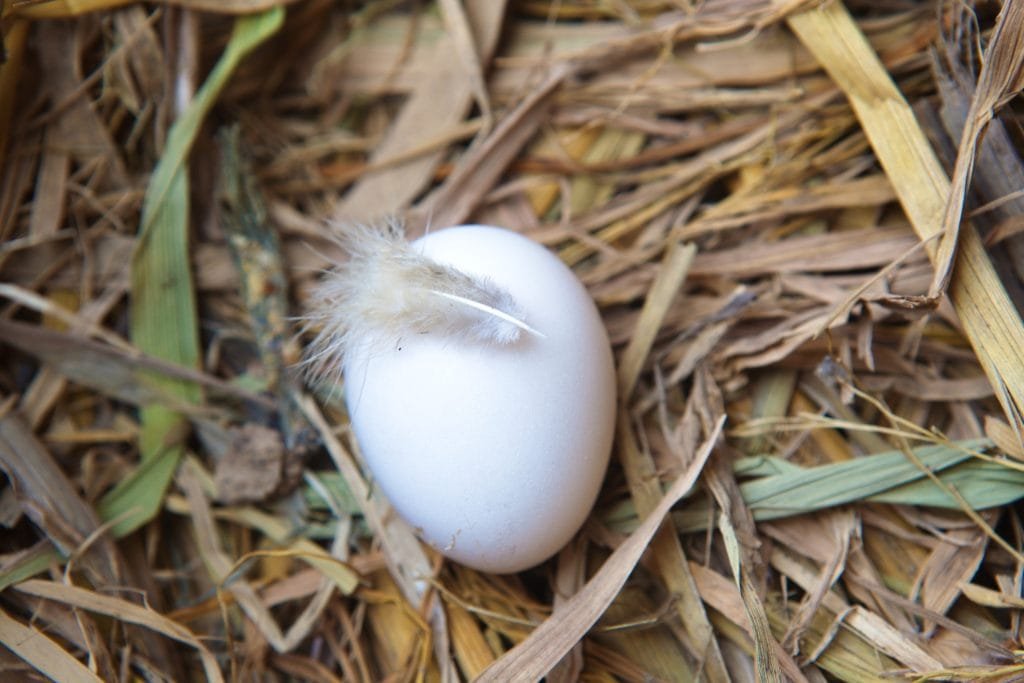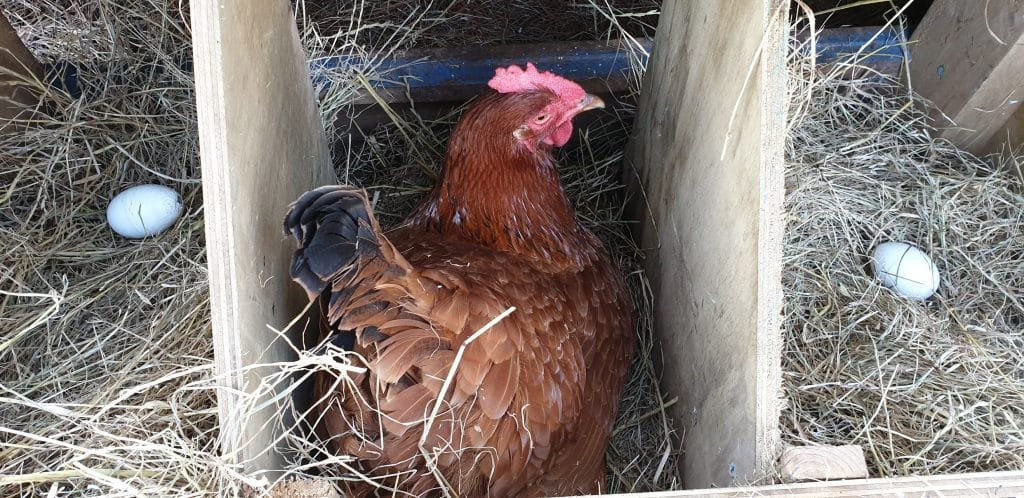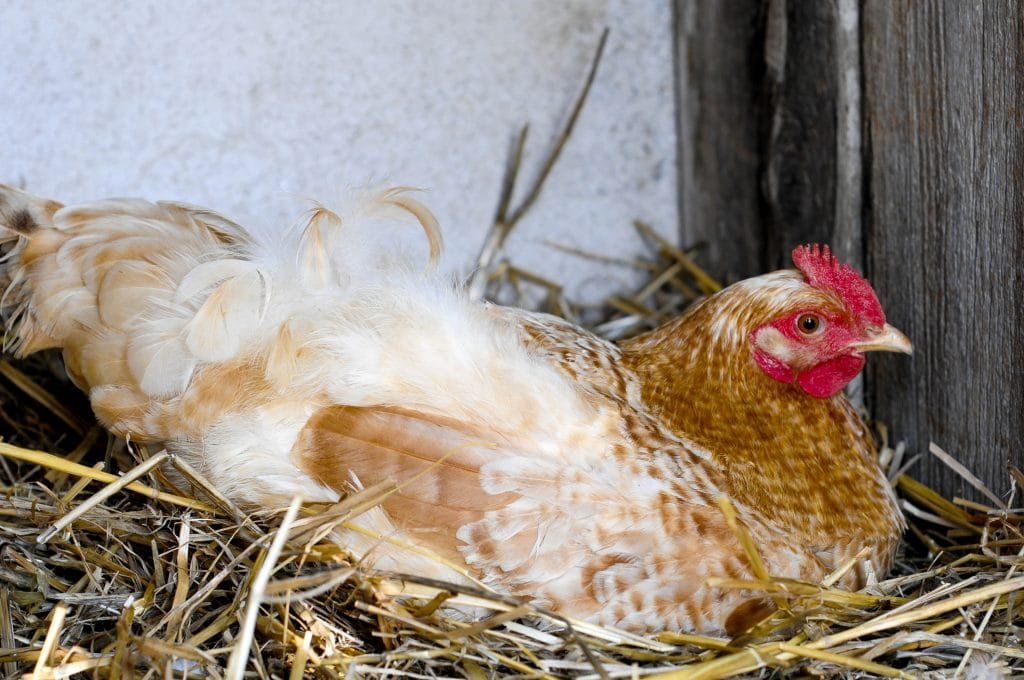This post contains affiliate links.
When you first step into the exciting world of owning chickens, it might feel like you are waiting forever for the appearance of the very first egg. When the day finally arrives that you spot a creamy shelled egg in the nesting boxes, your heart does a leap of joy. But once all your hens start laying regularly, you might soon find that collecting eggs becomes a chore and wonder if you need to collect chicken eggs each day.
Chicken eggs must be collected at least once a day. It is, however, recommended to collect eggs more frequently to keep them fresh and clean. Chickens usually lay within the first 6 hours after sunrise, so eggs should be collected first thing in the morning and, if possible, again each afternoon.
Working out a daily routine to gather eggs from nests will depend on your household schedule. However, there are many good reasons why chicken eggs must always be collected promptly besides just keeping them fresh.

How Often Should Chicken Eggs Get Collected?
Collecting eggs daily will ensure that they are consistently safe and delicious. However, hens are not machines, and the times they lay will vary according to their own body clock and the season. You need to stay flexible and be willing to adjust the collection routine until you find one that suits your setup.
Generally, it is safe to assume that almost all the hens will be finished laying by mid-afternoon. You might find one or two errant late eggs slipping through occasionally, but that definitely won’t be the norm. Light plays a critical role in egg production and hens usually ovulate in the morning. The egg then takes between 24 to 26 hours to be produced.
Depending on the breed and age, a healthy hen kept in optimal conditions can produce around 250 eggs per year. Egg production will naturally slow down during the colder months, but still, it is a significant number of eggs for such small birds.
If you have older hens who no longer produce eggs you might wonder what to do with them. Check out my article, Can You Eat An Egg Laying Chicken?
Every chicken owner knows the familiar excited cackling of a hen after it has produced an egg. Ideally, you want to be collecting the egg as soon as possible after it is laid. There are several reasons for this:
- The egg stays clean and fresh
- They don’t attract predators
- Chickens don’t form an egg-eating habit
- The weather doesn’t spoil the eggs
- If they are fertilized eggs, you want to avoid the onset of development
Leaving eggs in the nesting boxes can soon get out of hand if you have a large flock. Hens will continue to lay one egg on top of the next, so if you skip a few days, you won’t be able to tell which are the fresh eggs and which ones have been lying there for a while.
If you go on vacation or just away for the weekend and have someone coming to feed your chickens and other pets you need them to collect eggs each day as well. Allowing eggs to build up in nests is a quick route to creating problems that can be difficult to remedy once they have started.
Your own personal schedule will greatly determine how often you can collect eggs. A good egg-collecting rule of thumb is to collect eggs once in the morning and again in the afternoon. Try to make your egg collecting routine as easy as possible by providing nesting spots for your hens that are easily accessible and convenient to you.
Let’s go through the reasons why it is so important to collect eggs every day.
- HAPPY CHICKENS: Eggluuz chicken nesting boxes is specifically designed to create clean,...
- UNIQUE EGG COLLECTION DESIGN: This nesting box has a unique designed with a slight...
- DESIGNED FOR LASTING: The side and roof are made with galvanized steel for strong...
Collecting Chicken Eggs Ensures They Stay Clean And Fresh
There is no need to panic! Chickens do not usually poop anywhere near their eggs but leaving them in the nests for extended periods after they have been laid does increase the possibility that eggs may get soiled with chicken poop. They may also break as other hens move into the nest to lay.
If you are struggling with your chickens pooping in their water check out my article on how to solve this, How To Stop Chickens From Pooping In Their Water
Eggs become soiled if hens track poop or mud back into nests that already contain eggs. Whatever is on the chicken coop floor might be stuck on the hen’s feet and will soil the eggs in the nest. This can be particularly problematic during the rainy season. The best solution is to collect eggs as often as possible and try to create a carpet of fresh, dry bedding or a clean ramp directly in front of the laying boxes.
Hens, particularly very fluffy breeds, might have dirt or poop stuck to their feathers. Most of us who keep chickens know that hens jump up fairly quickly after laying, so they don’t often soil their own eggs. However, if the eggs are not collected promptly, another hen may come and settle to lay, leading to visible dirt on the outside of the shell.
It occasionally happens that chickens poop in laying boxes, but this generally occurs when chickens use their nesting boxes for roosting. The culprits are usually younger chickens who haven’t yet settled into the coop. In addition, they might not be able to reach the roosting area if they are smaller than the rest of the birds in your flock.
Addressing this is usually simply a matter of patience and a few evenings of removing the offending chickens from the nesting boxes and gently placing them onto the perches. If they persist, you may have to block the nesting boxes at night. Use an upturned box, stretch a piece of chicken wire, or use welded mesh wire across the front of the nesting boxes. Don’t forget to remove it at sunrise so your hens can get in to lay.
Although hens usually seek out the enclosed space of a laying box where they feel safe and can take their time while laying, sometimes new or younger hens have trouble understanding the purpose of your lovely nesting boxes. They may find a corner or just lay on the floor. The eggs are then not only trickier to collect but are more likely to get soiled.

An easy way to encourage new layers to use nesting boxes is to place a fake egg in each box. Hens usually quickly make the connection and realize that the nesting boxes are a safe place to lay eggs.
However, never use a real egg that could break or go bad. Worse still, another hen may try to eat the real egg and develop a bad habit. Fake eggs are either made of ceramic or plastic. I have even used a couple of golf balls.
To keep the eggs in your nesting boxes clean, one of the most important things is to create separate boxes if you are allowing your hens to brood. If you don’t, the eggs may not only become dirty, but they can get chaotic and confusing. Although a hen may be broody and incubating a clutch, other hens often continue to lay in their favorite box.
Laying hens often just double up with the brooding hen and use the same box to lay. Besides having to wrestle new eggs out from a very angry mom hen every day while dodging her sharp pecks, you won’t be able to tell the fresh eggs from the developing ones. Eggs may go bad or partially develop before you get to them, which is unpleasant in both instances.
Regularly Collecting Chicken Eggs Prevents Predators
Eggs are a sought-after protein-rich snack. This makes them an appealing food source for many predators that you definitely want to keep far away from your chicken coop. Once predators have associated your coop as a place where eggs are available, it won’t be easy to keep them away.
By collecting eggs daily, you will be able to discourage egg thieves like rats from visiting your coop. Of course, it is also essential to remove all chicken feed during the night. And it is not just rats that would like to feast on eggs in your coop; snakes will be hot on the trail of the rats, either for the eggs or in pursuit of the rodents.
Several other predators like possums, raccoons, and foxes may also start raiding your coop if eggs aren’t collected regularly. Collecting all eggs regularly will deprive predators of an easy meal and keep them outside in the wild where they belong.
Collecting Eggs Prevents Chickens Developing Bad Habits
One of the most frustrating and challenging habits that some chickens develop is egg eating. Once they have realized that eggs are easy to break and are tasty, some chickens actively seek eggs to eat. In many cases, they start eating eggs because of a calcium deficiency, which can be remedied by feeding a balanced laying feed.
Egg eating is a problematic chicken habit to break once it starts. Besides just correcting the feeding, one of the most effective methods to manage egg-eating behavior is to ensure it never starts. Collecting eggs as soon as possible takes the temptation out of the way.
It is important to remember that chickens are naturally curious birds. If your poultry is kept exclusively indoors, you should consider providing some stimulation activities to relieve boredom and mimic natural foraging behavior. This will further reduce any egg-eating behavior in your coop.
If you need ideas on how to keep your chickens entertained, check out my article Chicken Toys: 20 Ways to Keep Your Chickens Entertained
- Valued Chicken Coop Accessories Kit: Package include 1x Chicken Swing Toys, 1 x Chicken...
- Music Toys: Chicken Xylophone base is made of wood, key made by metal. Premium design for...
- Ladder Swing Toys: Made of natural pepperwood. Designed with colorful bell and wooden...
Collect Eggs Frequently So They Are Not Affected By Weather
Once a hen has laid an egg and moved off, the egg is at the mercy of the elements. Fortunately, eggs have a natural protective cuticle coating, known as bloom, which shields the contents from moisture loss and bacteria. Commercially purchased eggs have usually been washed, and the natural outer layer has been removed. That is why it is essential to refrigerate store-bought eggs.
Eggs lain outside a laying box will heat up in hot weather conditions. Most of us don’t have air-conditioned chicken coops, so during hot summer months, eggs become far warmer than the recommended room-temperature conditions. This not only affects the consistent quality of the eggs; they can be dangerous to eat.
Hot weather also means more light during daylight hours, which will mean peak laying season. Removing eggs from laying boxes regularly during the day is especially important to prevent them spoiling from overheating. If eggs are not collected for a few days, and the weather is consistently hot, fertilized eggs may even start to develop even without a broody hen.

On the opposite extreme are periods of intense below freezing temperatures. Although it is recommended to keep store-bought eggs refrigerated, whole eggs should never be frozen. Although laying slows down over winter, most hens do still lay, and eggs need to be collected quickly to ensure that they don’t freeze and crack.
During icy snaps, try to collect eggs more frequently than usual. Once eggs have frozen, they usually crack, which makes a mess inside the nesting boxes during the thawing process. It also makes the eggs more susceptible to bacteria entering since the outer protective bloom has been compromised.
If you live in a place with cold winters are worried about your chickens staying warm read my articles, Do Chickens Need An Insulated Coop? How To Keep A Warm Flock and 12 Tips to Keep Chickens Warm in Winter.
Collect Eggs Regularly To Prevent The Onset Of Incubation
While it is always good practice to collect eggs daily and more frequently if possible, it is more vital if you own a rooster and the eggs are fertilized. While it makes no difference in nutritional value if the egg is collected immediately and stored correctly, allowing eggs to pile up in the laying boxes with multiple hens laying each day could lead to the onset of incubation.
If you want a hen to incubate a clutch of eggs when it becomes broody, you can always give it some fresh, fertilized eggs when you move it to a brooding box. In any other circumstances, leaving eggs inside the chicken coop is never a good idea.
Final Thoughts
Chicken eggs must be collected at least once each day. The frequency may need to be increased depending on the size of the flock and the prevailing weather. It is never recommended to let eggs pile up because it can attract predators and could affect the eggs’ overall clean appearance and quality.


